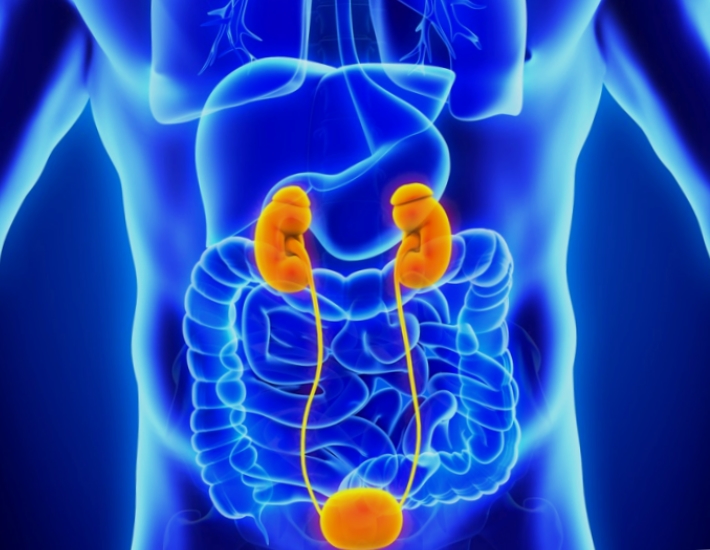Cancer of the ureter

Ureteral cancer is a disease affecting the mucous tissues of the urinary tract. By nature, it can be primary — appearing independently due to a combination of risk factors, or secondary - as a result of metastasis of cancer cells from another organ, most often the renal pelvis. Women are less susceptible to this disease. Ureteral cancer is detected at the age of 40 to 70 years. Without proper treatment, the pathology progresses and often leads to the development of bladder cancer.
Risk factors
-
Smoking, working in harmful industries — the epithelium of the urinary tract is very susceptible to the effects of chemicals. In this case, smoking causes the formation of substances with carcinogenic activity in the body. The development of ureteral cancer directly depends on the length of smoking and the number of cigarettes per day.
-
Urolithiasis, chronic inflammatory processes of the genitourinary system (for example, pyelonephritis), chronic kidney disease — inflammatory processes and constant irritation of the mucous membrane of the urinary tract leads to hyperplasia — an increase in the number of epithelial cells. Urinary obstruction can worsen the situation, which increases the contact time of the ureteral mucosa with harmful chemical compounds.
-
Genetic predisposition.
Symptoms of ureteral cancer
Ureteral cancer is manifested primarily by hematuria, an admixture of blood in the urine. This may be accompanied by pain in the lumbar region and frequent urge to urinate. Later, there is more blood in the urine and an increase in body temperature is added in the evening. Increased blood loss can lead to anemia. It is worth noting that such symptoms also occur in other diseases. Therefore, it is necessary to consult a doctor immediately to establish an accurate diagnosis.
Stages of ureteral cancer
stage 1: the tumor affects the mucous and submucosal tissues, but does not germinate further.
Stage 2: the tumor grows into the muscle layer.
stage 3: the tumor affects the fatty tissue near the ureter.
Stage 4: the tumor affects neighboring organs, metastasizes to lymph nodes and other organs.
Diagnostics
To diagnose the disease, a general urinalysis, a biopsy of the affected area, ultrasound of the kidneys, urography, urethroscopy, cystoscopy, MRI and computed tomography are prescribed.
Since the disease tends to metastasize, chest X-rays and ultrasound of internal organs are also prescribed.
Treatment of ureteral cancer in EMC
With a minor lesion of the ureter, the tumor is surgically removed, if the tumor is large, then the kidney and bladder are partially or completely removed, and a course of chemotherapy is prescribed. When choosing treatment tactics, concomitant diseases, the condition of both kidneys and the age of the patient are also taken into account.
The specialists of the Urological Clinic of the European Medical Center will provide qualified assistance and make every effort to achieve a positive result. Medical treatment is carried out using only original drugs approved by international and Russian control organizations in the field of healthcare. In surgical procedures, we prefer gentle, organ-preserving methods: laparoscopic, endoscopic and robotic (Da Vinci Si HD) operations.
Advantages of the robotic method:
-
careful dissection of fabrics;
-
reducing the injury rate of the intervention;
-
minimal blood loss;
-
short period of hospitalization and rehabilitation.
Postoperative period
One of the main advantages of minimally invasive surgery is rapid recovery. After the robotic operation, the patient stays in the hospital for 2 to 7 days. While after open surgeries, rehabilitation takes 2-3 weeks.
Why do they trust us?
-
An international team of doctors.
-
American and European treatment protocols.
-
Modern diagnostic equipment: MRI, CT and radiography with a minimum radiation dose, endoscopic examinations in conditions of drug-induced sleep.
-
Treatment methods that relieve the patient of pain and discomfort on the day of treatment.
-
Having your own hospital and physiotherapy department for quick recovery.
-
The EMC Urological Clinic is currently the leader among private clinics in Russia in performing oncological, nephrological, andrological and urological operations using a surgical robot.
Why the EMC
The first and only clinic in Russia, created in the image of the world's leading clinics
EMC is a multidisciplinary center offering patients a high level of medical services and a personalized approach
Worldwide recognition and awards
 Learn more
Learn more
Worldwide recognition and awards
 Certificates and licenses
Certificates and licenses
Make an appointment for a consultation
Specify your contacts and we will contact you to clarify the details
Reviews
and new products of the EMC



.webp)





.webp)


.webp)
